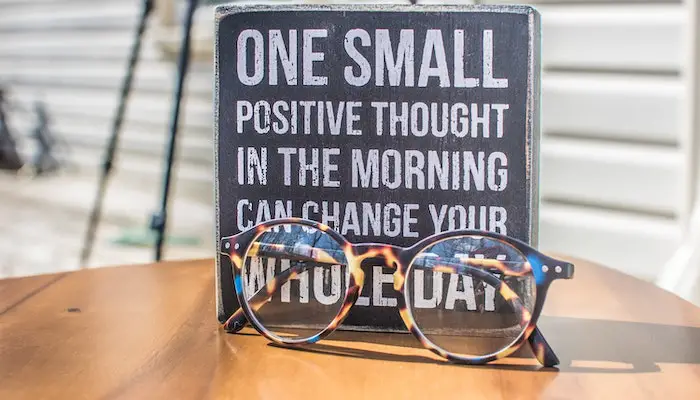Positive discipline, positive reinforcement, positive affirmations, positive thinking, positive living. Buzzwords you hear left and right that sometimes makes it seem like it is all that life is made of. And yes, positivity is good. It is more than just a buzzword.
Developing a positive mindset is important not only to live a happier life but to achieve long-term goals as well. People who have a positive outlook in life, the ones we call optimists, have been proven to be grittier. Unfortunately, it is a fact that people tend to pay more attention to and be affected by negativity than positivity.
Feeling unappreciated?
Try to think back to what has happened in the last few weeks or even months.

At work…
When did your boss last commend you for doing your job well? When or how many times were you called out for a slip-up?
At home…
When was the last time anyone thanked you for doing the dishes or cleaning the bathroom? When was the last time someone one of the kids whined about the food you prepared or got upset because you forgot to pick up something they needed for school?
As a child…
When was the last time your parents praised you for doing your homework independently or doing your chores? Now, when was the last time you got disciplined or scolded for not tidying up your room or getting home late?
If you are like most people, you probably counted that there are more instances where your unwanted behaviors were noticed compared to the number of times you were openly appreciated.
Now let’s flip the script. Think back to how many times you felt irritated or frustrated with a certain person in the last week. Next, think about how many times you felt like thanking that person for anything, be it something they do or the fact they are in your life.
While it may not be true for all, there is a good chance that you remembered more times when you distinctly felt negative emotions than you did positive ones. Why is this the case?
The Negativity Bias
The existence of negativity bias is well documented. What it means is that people have “the propensity to attend to, learn from, and use negative information far more than positive information.” Despite our best intentions, our brain is just hot-wired to remember and react more to negative things. Our brain literally uses “greater processing power” when it receives negative stimuli than when it does positive stimuli. This means that not only do we tend to pay more attention to negative things, but we also experience them with greater emotional intensity, AND remember them more than we do positive things.
The above exercise illustrates perfectly how negativity bias affects our perception of other people and thus, our relationships. Since people gravitate to negative information than positive information, we inadvertently overlook the good things others do.

In addition, negativity bias also affects the way we view ourselves. Remember all the niggling thoughts that result in self-doubt, self-criticism, low self-esteem, and self-directed anger? Negativity bias affects us greatly and has a huge role in the way formation of self-perception.
By now you are probably feeling a little bit down. If that is all true and we are built such that negativity trumps positivity, how can we ever find peace and happiness?
Living with joy in the world of negativity bias
1. Understand what negativity bias is and how it affects you and everyone else.
Congratulations! If you reached this part, then you have taken the first step in overcoming negativity bias.
Know thy enemy and know yourself; in a hundred battles, you will never be defeated. ~ Sun Tzu
2. Accept the entirety of your emotions
Knowing that negativity bias exists is not enough. It is crucial that you do some soul-searching to be aware of the negative thoughts that are on a constant loop in your head. This requires you to be honest with yourself and accept this side of yourself before you can do something about it.
Negative thoughts will invariably creep in. You will still feel a stronger knee-jerk reaction when negative situations arise compared to the high that you will get from most positive situations. That is just how it goes. It does not mean that you are losing the battle against negativity. It simply means that you are human. Accept this side of you and do not beat yourself up over it. Be kind to yourself. This is the time to develop more self-compassion as you recognize that there is much work to be done to be able to truly live a life of positivity.
3. Consciously choose to focus on the positive rather than the negative.
Accepting the different facets of your emotion does not mean giving in to negativity. Instead, you should also recognize the positivity that exists in you and choose to focus on that. Nurture the positive and starve the negative.
There are so many ways to nurture positivity in the midst of negativity, so don’t wait till you are feeling down before trying to combat the negative. Instead, get a jump on it and arm yourself by surrounding yourself with positivity. You can do this by reciting self-affirmations every day, listing down things you like about yourself and posting it somewhere you can always see, and keeping a gratefulness journal.

When it comes to protecting relationships, you need to reframe your thoughts by intentionally noticing the good in others and expressing your appreciation more often. Pet peeves and downright negative interactions will probably test your resolve, but after silently acknowledging how it made you feel do your best to distract yourself and focus on the other good experiences you’ve had that day.
Remember you can always choose to turn your back on negative thoughts and situations. Positivity is not magic. Like most things in life, it is a choice you have to make with each passing moment.



